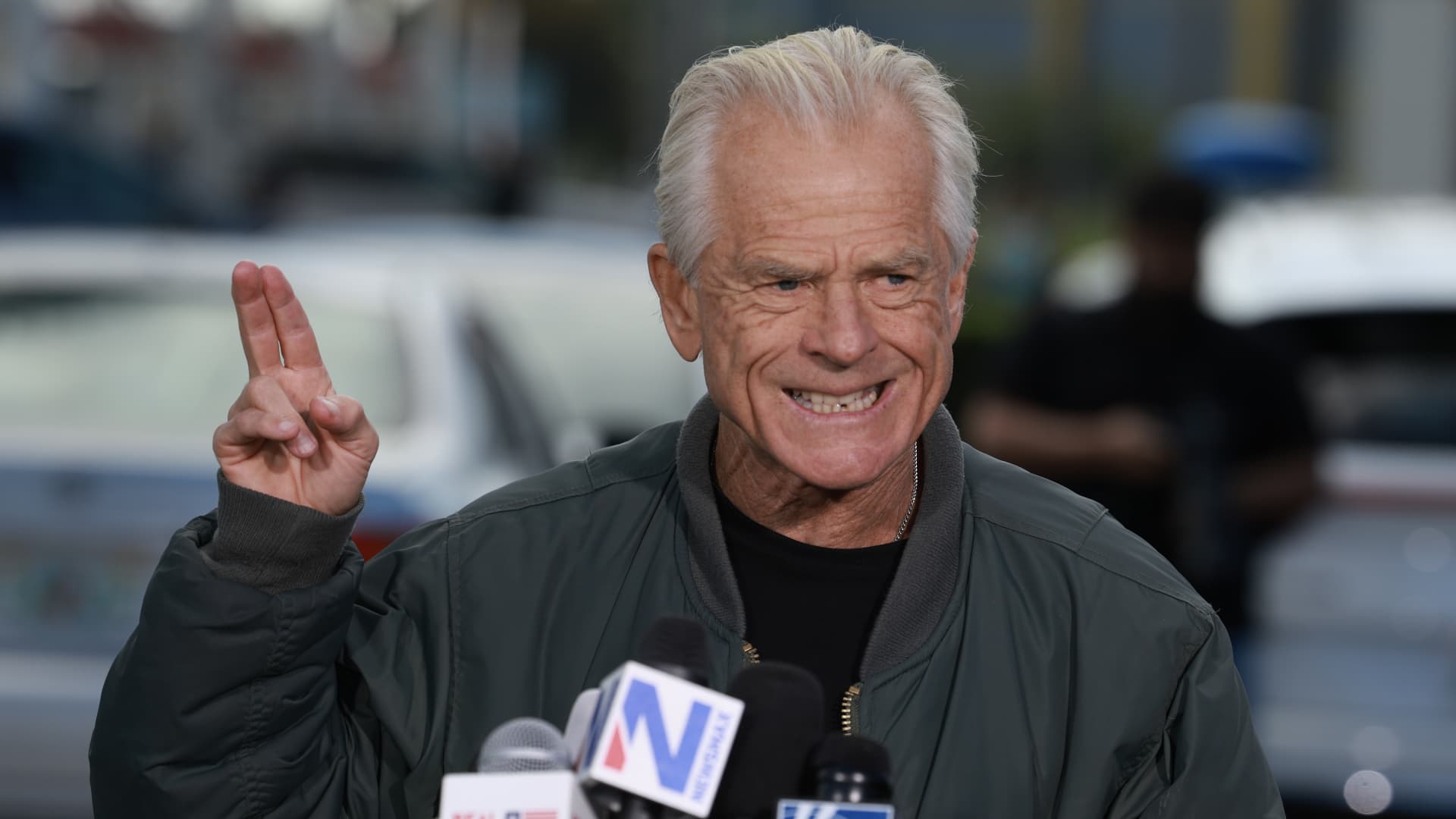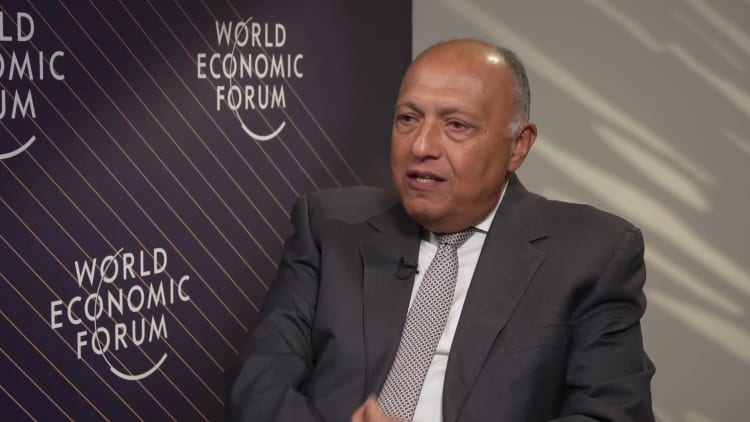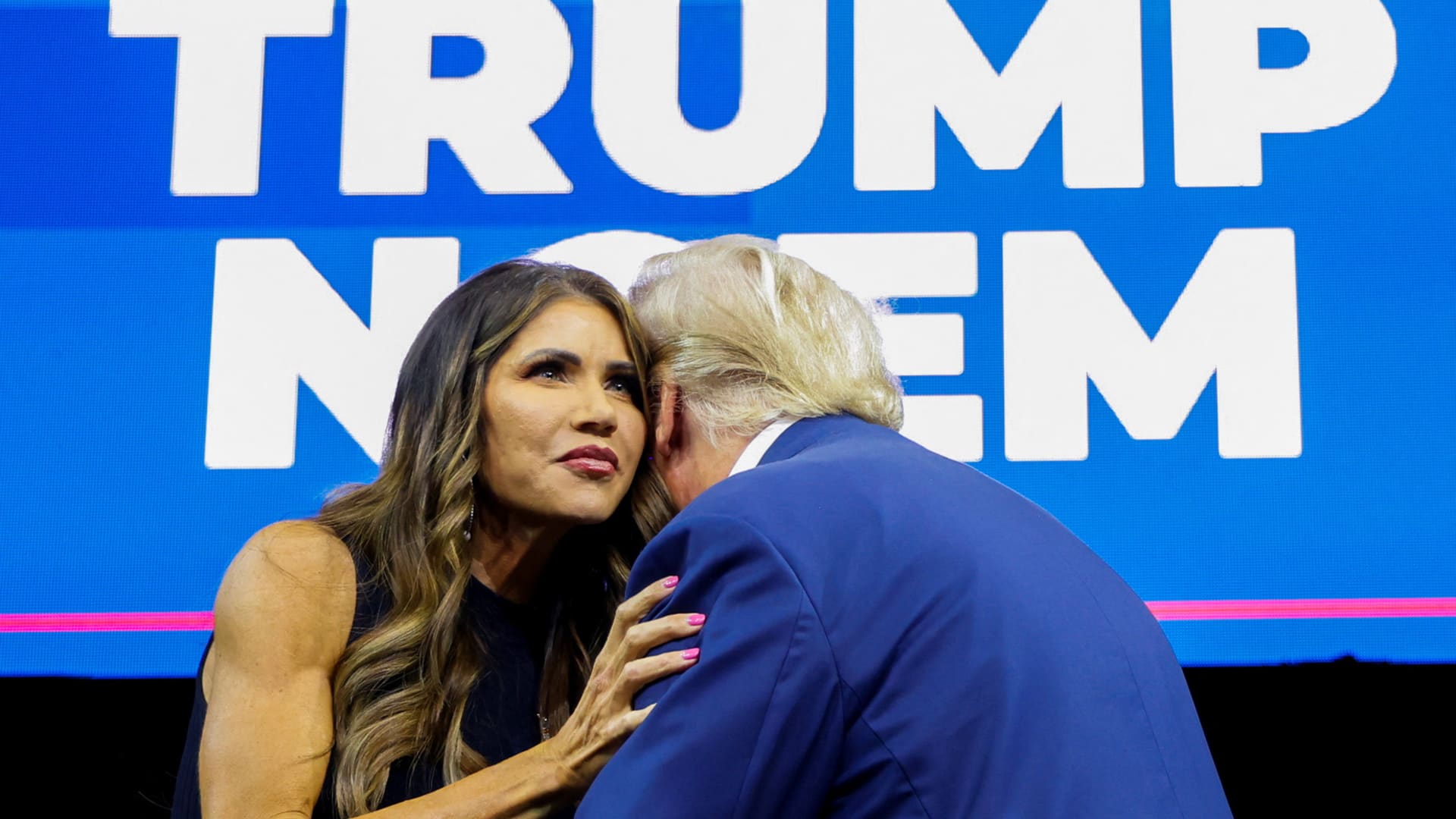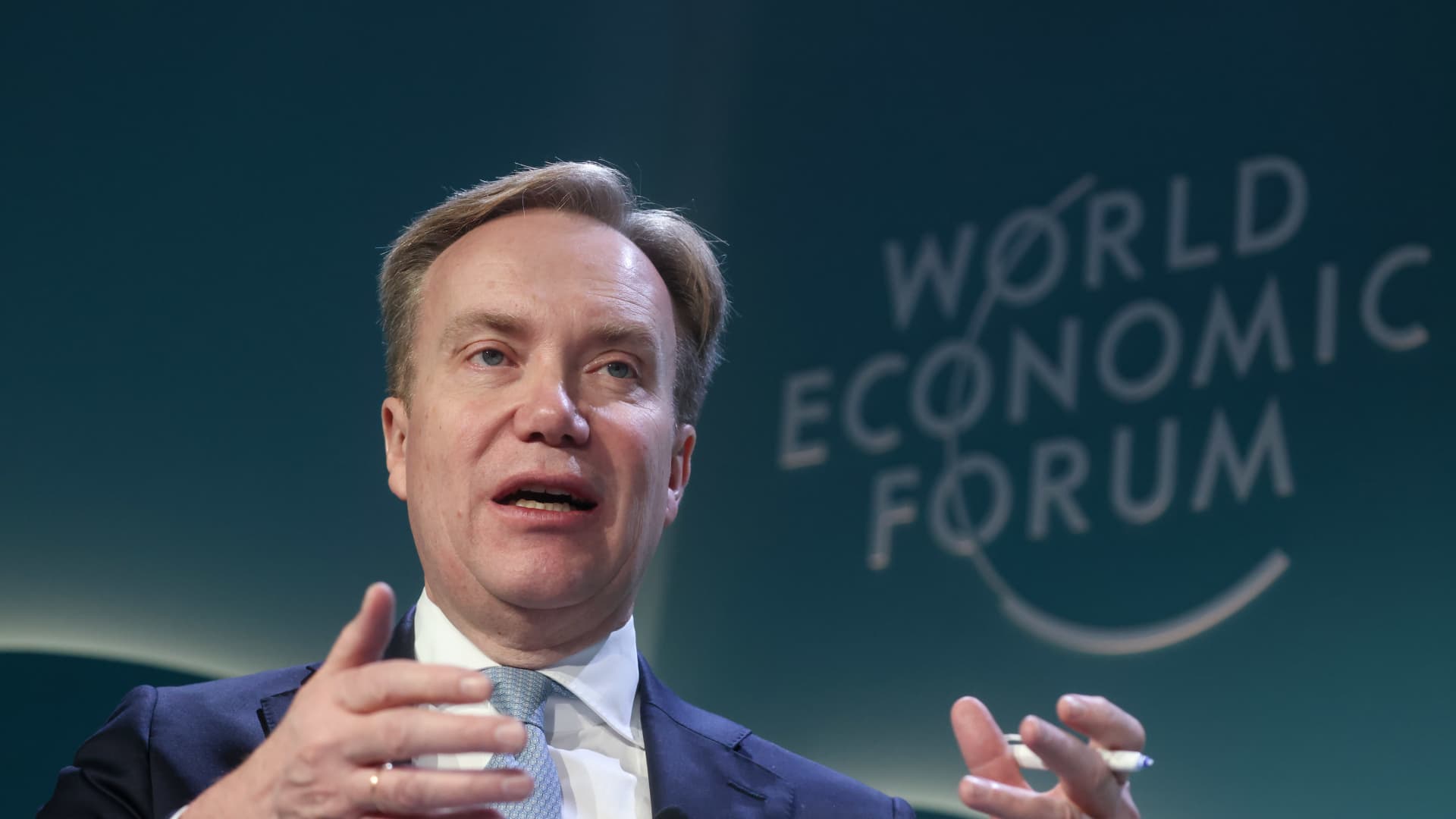There was anxiety in the thin mountain air when the planet’s economic leaders gathered in January at Davos for the 54th meeting of the World Economic Forum. Donald Trump had just trounced Nikki Haley in the Iowa caucuses, all but securing the Republican nomination for president. Haley was reliable, a known quantity. A resurgent Trump, on the other hand, was more worrying.
The Davos attendees needed reassurance, and Jamie Dimon, the chairman and chief executive of JPMorgan Chase, had some to offer. In an interview with CNBC that made headlines around the world, Dimon praised Trump’s economic policies as president. “Be honest,” Dimon said, sitting against a backdrop of snow-dusted evergreens, dressed casually in a dark blazer and polo shirt. “He was kind of right about NATO, kind of right on immigration. He grew the economy quite well. Trade. Tax reform worked. He was right about some of China.” Asked which of the likely presidential candidates would be better for business, he opted not to pick a side.
“I will be prepared for both,” he said. “We will deal with both.”
Dimon presides over the largest and most profitable bank in the United States and has done so for nearly 20 years. Maybe more than any single individual, he stands in for the Wall Street establishment and, by extension, corporate America. With his comments at Davos, he seemed to be sending a message of good will to Trump on their behalf. But he also appeared to be trying to put his fellow globalists at ease, reassuring them that America, long a haven for investors fleeing risk in less-stable democracies, would remain a safe destination for their money in a second Trump administration.
But would it? As Dimon noted, for all Trump’s extreme rhetoric in the 2016 campaign — his threats to rip up America’s international trade agreements and his attacks on “globalization” and the “financial elite” — his presidency, like most presidencies, proved to be business-friendly. Corporate America wound up with plenty of allies in the administration, from Secretary of the Treasury Steven Mnuchin, a former Goldman Sachs executive; to Secretary of Commerce Wilbur Ross, a Harvard Business School-educated bankruptcy guru; to Trump’s son-in-law Jared Kushner, an aspiring Wall Street player. And the Trump administration’s economic agenda of reduced taxes and deregulation largely suited corporate America’s interests; JPMorgan saved billions of dollars a year thanks to Trump’s corporate tax cuts.
But Trump and those around him are signaling that a second Trump administration would be very different. They promise a more populist economic agenda and a more populist governing style to match, with steep tariffs on imported goods and punitive measures against companies that do business with China. And his team has been clear about the fact that Trump is ready to move ahead without the blessing of the business community. “You’ll see loyalists,” says Brian Ballard, a fund-raiser and former lobbyist for Trump. “Wall Street’s supermen who thought they were the smartest guys in the room? That sort of stuff he won’t tolerate.”
Scholars who have spent their careers studying populist movements are not confused about what to expect. They have seen this sequence of events play out before, to disastrous effect not just on democracies but on businesses — and business leaders. If history offers any guide, they say, it’s that the Davos crowd should be a lot more concerned about a second Trump term.
For all the free-floating anxiety at Davos, America’s executive class seems to be maintaining a base-line faith that its interests aren’t really on the ballot in November — that no matter who occupies the White House, the conditions that have kept it at the center of the global economy for a century aren’t in any real danger. But those conditions could easily change, and significantly.
There may be nothing executives can say or do that would make a difference at this point. But they might want to start considering their options. “There has been this sense among business leaders that we can work with these people even if they sound kind of revolutionary because they will give us some things that are useful,” says Rawi Abdelal, a political economist and professor at Harvard Business School. “They are missing that this is a moment of systemic danger for capitalist systems as we know them, and globalization as we know it.”
The End of (Economic) History
For decades, America’s business leaders got more or less what they wanted from the White House, regardless of who occupied it. Communism had fallen, the Cold War had ended and nations around the world were opening up and integrating. The battle of ideas was over, presumably forever; capitalism had won. “At the end of history, there are no serious ideological competitors left to liberal democracy,” the American political scientist Francis Fukuyama wrote in his 1992 book, “The End of History and the Last Man.”
History had ended before. The Gilded Age of the late 19th century marked the last, climactic chapter of decades of largely unconstrained corporate growth and ostentatious displays of private wealth. Then, as now, populists protested. Depression and war came next, accompanied by a new regulatory regime — the New Deal. Years of rapid growth and reduced income inequality followed, but they came to an abrupt halt with the oil crisis and recession of the mid-1970s. Free-market orthodoxy, now in the name of “neoliberalism,” began another ascent under the Democratic regime of Jimmy Carter and reached its full flower under Ronald Reagan’s presidency in the 1980s.
The Democrats who followed Reagan largely hewed to the same pro-business handbook, limiting government interference in the economy. Corporate America, and Wall Street in particular, rarely shy in their efforts to capture the government and deploy regulatory powers to their own ends, found an increasingly warm welcome in Washington. They sent a steady stream of people into positions of power in each successive administration, while at the same time hiring armies of lobbyists and donating generously to political campaigns and political action committees to preserve the status quo.
‘The business community here doesn’t understand what is about to hit them.’
After Brexit — the United Kingdom’s withdrawal from the European Union in 2016 — there could be no doubt that history had started again. A new populist wave had already been swelling for years, but the world’s business leaders were nevertheless blindsided by the referendum’s passage, having vastly underestimated the growing backlash against globalization. Stock markets around the world tanked as investors worried about what this wave of nationalism might mean for Europe and the broader economy. For many British businesses, the effects of Brexit have been devastating, reducing investments, increasing costs and creating both labor and supply shortages. Populism has continued its march ever since, with citizens around the world seemingly eager to burn down the neoliberal global economic order.
Trump’s rise seemed to mark the arrival of this wave on America’s shores, but his antiglobalist rhetoric on the stump didn’t amount to much once he was in office. The business community got the tax cuts and deregulation that it wanted, even if Trump’s public image created problems for executives who had to answer to shareholders or employees. After Trump’s comments defending white supremacists at the protest in Charlottesville, Va., in 2017, a number of prominent executives resigned from two presidential business advisory councils, forcing him to disband the groups. Then, when Trump refused to accept the results of the 2020 election, and again in the aftermath of the attack on the Capitol on Jan. 6, 2021, nearly 50 chief executives, including the heads of Johnson & Johnson and Walmart, came together to rally behind America’s democratic institutions. Still, when all was said and done, the Trump presidency was good for business leaders, driving up stock prices and spurring an increase in mergers and acquisitions and initial public offerings.
Their memories of that era have surely been made rosier by their frustrations with President Biden, who has been a much more proactive regulator. His Securities and Exchange Commission has issued a raft of rules constraining the conduct of financial institutions; his Federal Trade Commission and Justice Department have begun an aggressive antitrust crusade; and his National Labor Relations Board has pursued an unambiguously pro-union agenda.
The Biden administration is also notably light on former corporate executives. “Nobody there is wired into the business world, even in seats where you would normally find them, like Treasury or commerce,” says Lloyd Blankfein, the former chairman and chief executive of Goldman Sachs. “And they don’t seem to want any.”
But scholars of populism warn that a second Trump administration could be far more destabilizing to America’s business leaders and to the larger global economic order. Rachel Kleinfeld, a senior fellow at the Carnegie Endowment for International Peace, detailed the many potential dangers ahead in a report last year, “How Does Business Fare Under Populism?” Examining the recent economic histories of Hungary, Brazil and India, she found that populist governments significantly increase volatility and risk by using their regulatory power to tilt markets or outright take control of businesses. The report makes for ominous reading for those accustomed to the comfort and stability of the neoliberal orthodoxy. “The business community here doesn’t understand what is about to hit them,” Kleinfeld told me.
‘Massive Economic Shock Waves’
Trump has made no secret of his intentions. Over the course of his campaign, he has outlined a radical program of protectionism, calling for a phaseout of all “essential goods” from China, as well as a ban on investments in China and on federal contracts for any company that outsources labor to China. All of this would be concerning enough for American business. But Trump has also proposed a 10 percent tariff on all imported goods, which would amount to the declaration of a global trade war, with other countries almost certainly retaliating with their own tariffs.
Together, these protectionist policies would drive up the cost of goods, create sweeping supply-chain issues and quite possibly cause hyperinflation. “We’re talking about massive economic shock waves,” says Lisa Graves, executive director of True North Research, a national watchdog group that studies government oversight of business. And tariffs are just the beginning. Trump’s promise to initiate what he calls “the largest deportation operation in American history” could be catastrophic for employers already facing a tight labor market.
Trump’s evolving policy views are in step with the broader populist migration of the conservative movement. Last year, Project 2025, an effort of more than 100 conservative organizations led by the Heritage Foundation, published a 900-page report called “Mandate for Leadership: The Conservative Promise,” which is essentially a blueprint for a second Trump administration. In addition to embracing radical protectionism, it calls for the next president to reduce the power of the Federal Reserve, limiting its ability to serve as a so-called lender of last resort for banks and other financial institutions facing cash crunches. This would increase the risk of financial crises, undermining confidence in the U.S. banking system and its financial markets. “The power of the Federal Reserve to step in and provide economic relief to stop the spread of economic chaos is what saved us in 2009,” Graves says. To limit any internal opposition to his agenda, the report also calls for Trump to reimpose an executive order that Biden revoked, enabling him to fire thousands of civil servants across his administration and replace them with political appointees.
There are other, more existential reasons for concern, too. A hallmark of populist leaders is to tighten the state’s grip on the business sector — a phenomenon that Ian Bassin, a lawyer and pro-democracy activist, calls “autocratic capture.” To get a sense of how this works, consider Hungary under Prime Minister Viktor Orban, a close Trump ally.
Like Trump, Orban governed as a traditional, pro-business conservative during his first term as prime minister between 1998 and 2002, cutting taxes and lowering government spending, in part to prepare Hungary to join the European Union. But he has been a very different leader since returning to office in 2010. In order to consolidate and maintain his power, he has nationalized parts of the private sector, forced banks to reissue mortgages at more favorable rates, ordered utilities to lower prices, levied “crisis taxes” on various industries and imposed price caps on foreign-owned supermarkets. “Anything you were counting on by way of predictability just disappears,” Kim Lane Scheppele, a professor of sociology and international affairs at Princeton University and an expert on Hungarian politics and law, told me. Along the way, Orban has made his friends and family rich, starting investigations, blocking mergers and directing the passage of legislation to devalue some businesses, which has made them vulnerable to takeovers by his allies or the government.
During a recent visit to the United States, Orban was shunned by the Biden administration but welcomed to Mar-a-Lago by Trump. He also spoke at the Heritage Foundation, which has a formal cooperation agreement with a think tank that has close ties to Orban’s government, the Danube Institute. “It’s clear that Project 2025 is a direct copy of what Orban did in 2010,” Scheppele says. “The parallels are very deep between these guys.”
Fear of Backlash
Privately, some business leaders and corporate executives have begun to express concern about at least some of what they are hearing from Trump. “They are ready to be galvanized into collective action if need be,” says Jeffrey Sonnenfeld, the founder and chief executive of the Chief Executive Leadership Institute at Yale. “But they aren’t going to speak out if it’s not necessary.”
It’s easy to understand their hesitation. A number of businesses have already faced punishing backlashes from conservatives for embracing social causes like L.G.B.T.Q. rights. And Trump would almost certainly not hesitate to use the levers of government against anyone who opposed him. In fact, he already appears to have done so. During his presidency, his otherwise merger-friendly administration sued to block AT&T’s purchase of CNN’s parent company, Time Warner, causing months of costly delays. The Justice Department has denied that Trump’s hostility to the news outfit influenced its decision. Either way, he is widely understood to be a vindictive man. “I am your retribution,” is how he put it to supporters on the campaign trail.
Speaking out could be scary. And yet the entire global economic order might be at risk. Enlightened self-interest typically requires businesses to stay on good terms with those in power, but for Dimon and the Davos set today, that may turn out to be a fatally short-term view. “The only thing we know for sure about globalization,” Harvard’s Abdelal says, “is that it’s desperately fragile and can easily be broken.”
Source link
2024-04-07 09:04:10
www.nytimes.com










